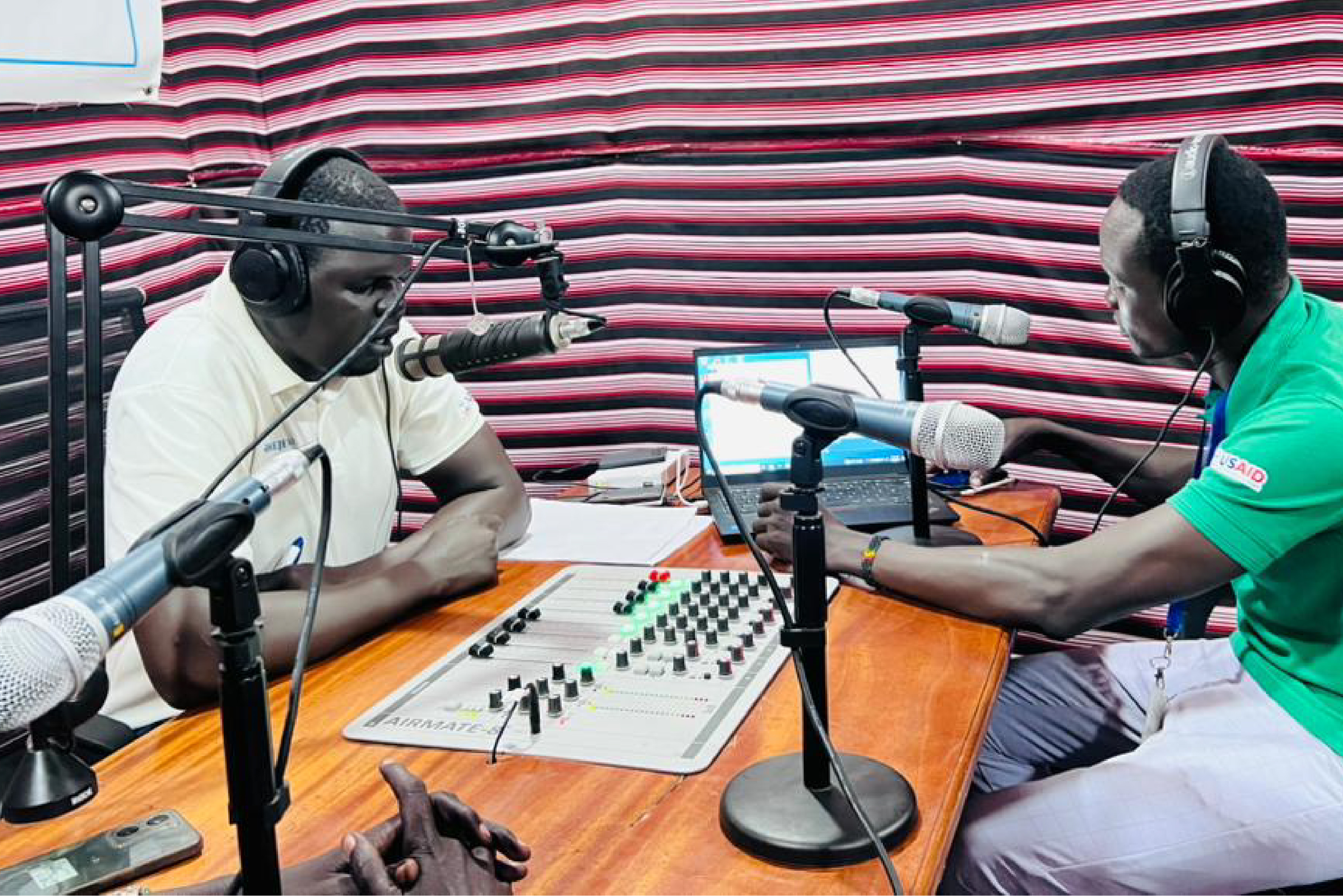
How do you reach illiterate people residing in remote areas of the newest nation in the world to relay important messages of peace and reconciliation, education, and healthcare? DT Global, through the USAID Shejeh Salam (“promoting peace”) program has found a way to do so in South Sudan using radios.

In commemoration of World Radio Day 2024, USAID Shejeh Salam is launching its third consecutive year of radio distribution throughout South Sudan, where 70% of the adult population is illiterate. The specially designed bright yellow solar powered, wind-up radios, pre-loaded with hours of listening content, are now well recognized and sought after items throughout the country. Distributed in 13 of the least developed counties in South Sudan, these radios are the only means by which many citizens receive reliable news and information, tune into existing FM community radio stations and shortwave broadcasts, and receive important messages extolling peace. The pre-loaded memory (SD) card content takes the form of popular ‘trauma dramas,’ talk shows, jingles, and other programs contextually relevant to South Sudanese culture and recorded in a variety of languages understood by different ethnic groups found throughout the country.
Keat Tuol Wial, a member of the Presbyterian Missionary Elder’s Radio Listeners Group in Leer County, Unity State, shares:
"The Life of Lulu (a pre-loaded drama) show in our Nuer language has a positive impact on our community because it explains the need to accept trauma as a way to begin the reconciliation process. It helps us learn the art of peaceful coexistence within our community and to spread these messages to our neighbors. Radio is a powerful platform to express the values of peace and harmony and contributes to the well-being of our society."
As rural South Sudanese communities are sparse and often far between, Shejeh Salam distributes radios to community figures well-placed to organize local listening groups, who typically gather at water distribution points, markets, or tea shops.
Rose Lomare, a 32-year-old community leader and head of the Logormoi Village Savings and Loaning Association (VSLA) radio listener group in South Sudan’s Eastern Equatoria State, speaks with passion about the transformative power of radio. "I am drawn to talk shows that delve into community issues and offer valuable insights on health and education," she explains. "These programs empower us with knowledge, fostering a sense of unity and understanding. It unites us as South Sudanese."
In Jonglei State, Akobo County radio listener 29-year-old Mamuch Dawech Chan recounts, “Radio has changed my perspective about violence and conflict. I used to sit idle and engage in crime and violent behavior. I’ve learned this is not the way to behave. In one of the talk shows, there was a proverb used that says, ‘money is in the bush’. It encourages youth to go out to the bush to collect construction poles, grasses, or engage in fishing to earn income. I’m now outside working hard for my family.”
“We listen to the radio and talk about peace while selling our fish in the market,” said 52-year-old Marial Wuor Kon. “As a group leader, I fell in love with the radio due to its usefulness in keeping us informed about things happening on a daily basis. Through the radio, we have more understanding about forgiveness and reconciliation, as well as tips as to how to run small business.” Marial Wuor Kon is from a local fishing group in Akobo County, which is an area crisscrossed by rivers where many make their living by deep water river fishing.

Recognizing the valuable input radio has in terms of building peace, USAID Shejeh Salam also supports community radio stations in several key areas in South Sudan. In the last nine months Shejeh Salam built and equipped stations and trained radio presenters and technical staff. The project supported the launch of Leer FM, in Unity State located in the northern section of the country, Akobo FM in Jonglei State on the Ethiopian border, and Pibor FM in the Greater Pibor Administrative Area.
Nyakume Maguek Gai, a 29-year-old female journalist who reports for Leer FM emphasizes the positive impact of radio on youth and promoting peaceful conflict resolution. “We use radio as a tool for accurate information and community education as well as promoting peace and neutrality." Gai says with a message to fellow journalists: "Let us be the voices of reason and unity, wielding the power of information for the betterment of our communities."
Shejeh Salam utilizes its network of community radio to promote peacebuilding efforts and events, while other donors and local community actors are increasingly turning to radio to amplify their development work and advocacy efforts.
Juma, who is a member of a dominos playing radio listening group in the Greater Pibor Administrative Area (GPAA) has a powerful message for his fellow South Sudanese: "Let us harness the power of radio to spread hope, understanding, and positive change. Together, we can transform our communities, one impactful message at a time."
In South Sudan, every day is devoted to radio, so be on the lookout for one of Shejeh Salam’s famous yellow radios and take the time to sit down, turn on, and tune into peace.